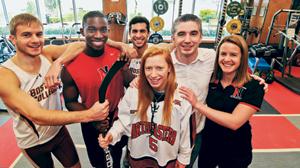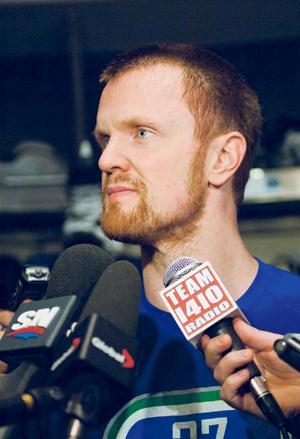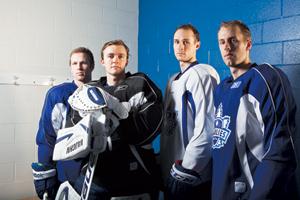
"TK" King, runner, Boston College; Jacob Aduama, goalie, Northeastern University soccer; Jose Estevez, runner, Boston College, Kelly Wallace, forward, Northeastern; Patrick Burke; and Sarah Cahill, coach, Northeastern. Credit: Arthur Pollock

Canucks player Henrik Sedin. Credit: Sergei Bachlakov
Homophobia reared its ugly head in the world of sports more than once in 2012. But for the first time, a movement of allies is gaining ground and slowly changing professional sports from the inside.
This was unthinkable even one year ago.
It started in hockey. Toronto Maple Leafs general manager Brian Burke and his son Patrick launched the You Can Play project in March, in honour of Brian’s youngest son, Brendan, who had come out in 2009. Brendan was the first semi-professional hockey player to fight for the rights of gay athletes. Tragically, he was killed in a car accident the following year.
The You Can Play message is simple, groundbreaking and effective: “If you can play, you can play.” Sexuality is irrelevant.
It’s a message that resonates. And it didn’t take long before athletes from across North America began stepping up and declaring themselves allies, vowing to stamp out anti-gay slurs and help kick open the closet door should a gay player want to come out.
The Vancouver Canucks were quick to get on board. Stars Ryan Kesler and Henrik Sedin told Xtra they’d be proud to welcome a gay teammate.
Vancouver Whitecaps soccer star David Testo, who came out at the end of 2011, is one of the world’s very few openly gay professional athletes. About 30 other athletes followed his lead and came out in 2012, according to Jim Buzinski, co-founder of outsports.com.
In November, just in time for the 100th Grey Cup, two players on the Toronto Argonauts — offensive lineman Joe Eppele and wide receiver Mike Bradwell — stepped up in support. Then, the following week, the Argos’ Grey Cup rivals also reached out: Calgary Stampeders running back Jon Cornish declared himself an ally, but he warned that sports still has a long way to go.
As former NBA player John Amaechi told Xtra, “homophobic language is du jour” in all sports. “As all boys, all men who have played sports know, when you do something bad, you’re a ‘wuss’ or a ‘fag’ or worse.”
More recently, the American Hockey League’s Toronto Marlies took a team-wide pledge to no longer tolerate homophobic, sexist or racist language on or off the ice. Then Major League Soccer’s Toronto FC joined You Can Play, followed by Division 1 of the NCAA (the National Collegiate Athletic Association), representing college sports throughout the United States and Canada.
There were a few disappointments in 2012, however.
In November, Cleveland Browns linebacker Tank Carder sent out several homophobic tweets, followed by an unapologetic statement that he “doesn’t agree with being gay or lesbian” and that “saying faggot doesn’t make me a homophobe.”
Another frustrating moment came in September, when Toronto Blue Jays shortstop Yunel Escobar found himself at the centre of a controversy after writing a homophobic slur in the eye-black on his face. Two months later, he was traded to the Miami Marlins.
But also this fall, a pro football player in Minnesota took it upon himself to show the world what being an ally means.
Vikings punter Chris Kluwe unleashed a razor-sharp attack on an anti-gay politician in Maryland who chastised his friend, Baltimore Ravens linebacker Brendon Ayanbadejo, after he voiced support for equal marriage.
And in amateur sports, some gay and lesbian athletes cautiously stepped out of the closet.
At the Summer Olympic Games in London, American soccer player Megan Rapinoe told the world she is gay. “This is the best I’ve ever played,” she later told Xtra.
But out of nearly 11,000 athletes representing 204 nations at the 2012 Olympics, only 25 (representing 10 nations) were openly gay. That’s about 0.2 percent.
For most players, coming out is still not an option.
“A lot of the athletes come from very homophobic countries,” says Blake Skjellerup, who came out publicly after placing 16th in short-track speed skating at the Vancouver 2010 Winter Olympics. Skjellerup was supported by Pride House, which is working to make the Olympics gay-friendly. Sadly, Pride House has been banned from the upcoming Winter Olympics in Sochi, Russia.
While more straight allies have come out in the past year than have come out in the past decade, professional sports remains one of the last great bastions of institutionalized homophobia.
But there’s hope for the future, with allies like the You Can Play team. And the movement seems unstoppable.

 Why you can trust Xtra
Why you can trust Xtra


